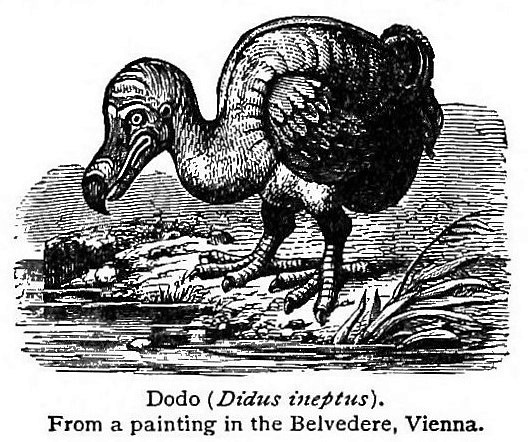The phrase (as) dead as a dodo, or (as) dead as the dodo, means, of a person or thing, irretrievably defunct or out of date.
The following definition of the noun dodo is from The Century Dictionary (New York, 1904):
A recently extinct bird of Mauritius, Didus ineptus, the type of the family Dididæ and suborder Didi, now usually assigned to the order Columbæ. The dodo was living in Mauritius on the discovery of that island by the Portuguese under Mascarenhas in the beginning of the sixteenth century, and it is known to have survived until July, 1681. Knowledge of the bird was for some time confined to the quaint and often questionable narratives of voyagers, certain pictures, mostly by Dutch artists, and a few fragmentary remains. In 1866 bones in abundance were found, and the osseous structure has been described in detail. The dodo was a massive, clumsy, flightless, and defenseless bird, about as large as a swan, covered with downy feathers, with a very stout hooked bill, short strong legs, short tail, and wings too small for flight; so that it soon succumbed under the new conditions which the occupation of the island introduced, its extinction being probably due as much to the animals which man introduced as to the human invaders of the island.
illustration from The Century Dictionary (New York, 1904):
Dodo (Didus ineptus).
From a painting in the Belvedere, Vienna.
The earliest instance of the phrase that I have found is from Bold Admiral Blake¹, an unsigned article published in Household Words (London) of Saturday 19th June 1852—the author was probably the English novelist Charles Dickens (1812-70), who “conducted” this weekly journal:
It has often excited my wonder that we have never had, until to-day, for the benefit of Her Majesty’s navy, anything like a competent and copious account of the life and career of the renowned Admiral Blake. Little is really known about him in the navy, or out of it. In the navy (and I appeal to my old messmates in the Bustard), two obstacles interfere with his due reputation. One of these is the glory of our latest batch of heroes—the Nelsons² and Collingwoods³—which is too brilliant for it to be easy to see back through it. The other obstacle is, that the times are so very different. Benbow⁴ (who represents the period between Blake and Nelson) is as dead as the Dodo, and now enjoys a semi-facetious reputation, something like that of his pig-tail.
¹ Robert Blake (1598-1657)
² Horatio Nelson (1758-1805)
³ Cuthbert Collingwood (1748-1810)
⁴ John Benbow (1653-1702)
The phrase gave rise to a pun in the following passage from In the Matter of Promotion. Being a Letter to a Venerable Premier⁵, published in Fun (London) of Saturday 3rd February 1866:
The Whigs have broken down: they have collapsed—gone under—“gin out.” Even your lordship, generally ready enough to serve your friends, has not ventured on promoting any young man of your own sacred set to high office, and for the simplest of all reasons. My lord, there are no Whigs under seventy. That marvellous party, which had so gallantly accepted for many years the task of governing the British empire—that heroic party is nearly extinct. Mr. Charles Darwin, a naturalist, who, I am sure, must regard your lordship with a peculiar interest, tells us how, in the stern struggle for existence, only the stronger types are able to perpetuate themselves. There are plenty of Tories left, there are plenty of Liberals, but that interesting link between the two species, or rather that melancholy high-bred hybrid, the Whig—the Whig is gone.
The Whig is as dead as the Dodo—in contradistinction to which lamented bird, perchance, he will be known to future and almost incredulous ages as the Don’t-don’t! For, of late years, the only thing that any Whig ever did, was his country.
⁵ John Russell (1792-1878), 1st Earl Russell, Prime Minister of the United Kingdom (1865-66)
There is also a pun in the following paragraph from The National Republican (Washington, D.C.) of Saturday 12th February 1881:
Mr. Cox, in his speech on the river and harbor bill, alludes to the Democratic party as being dead as a dodo, which highly-ornamental bird is found, upon reference to the authorities, to have become extinct through the agency of man. The parallel holds good. The dodo is dead, the Democratic party is do., do.

